Opinion
CBN: THE DIASPORA EXPLORATION

By Dr Ibrahim Modibbo
In the race towards globalisation and multiculturalism in modern economies, consensus is built around strategic thinking for the common good of the people. Conscious of the enormity of myriad of problems confronting the Nigerian economy, the Central Bank of Nigeria is strategising with focus on exploring the threshold of the problems with a defined trajectory of revamping the economy.
In a world increasingly driven by the movement of people, the financial contributions of Diasporas are becoming indispensable to many nations’ economic development.
For Nigeria, a country with one of the largest diaspora populations globally, remittances should be considered as a critical lifeline, not only for millions of households but for the national economy.
Recognising this potential, the CBN under the leadership of Governor Olayemi Cardoso has embarked on a strategic campaign to strengthen the ties between the Nigerian diaspora and the country’s financial system, with the objective of turning remittances into a powerful engine for sustainable economic growth.
At the heart of this initiative is the CBN’s recent engagement in Houston, Texas, United States of America, where the Deputy Governor (Economic Policy), Muhammad Sani Abdullahi, led a team of stakeholders in a forum titled: “Optimizing Remittances to Nigeria: A Vision for the Future.”
The forum, which featured representatives from the Nigeria Inter-Bank Settlement System, major Nigerian banks, and International Money Transfer Operators, was part of a larger series of engagements to improve remittance flows and maximise their impact on Nigeria’s economic development.
Remittances are a crucial component of Nigeria’s economy, with the World Bank reporting average inflows of $20.5 billion annually over the past decade. However, much of this money is directed towards consumption, with only a fraction being utilised for investments that could foster long-term development.
This is where the CBN’s current efforts are groundbreaking. Governor Cardoso’s administration is focused on transforming remittances from mere tools of consumption into catalysts for growth, highlighting the importance of strategic investments in sectors like real estate, technology, infrastructure, and manufacturing.
In addressing the Houston forum, Abdullahi highlighted the importance of engaging the Nigerian diaspora in this vision, stressing the need to channel remittances into productive sectors that can spur inclusive economic growth, create jobs, and foster financial inclusion.
“We are committed to doubling the volume of capital inflows and remittances to Nigeria,” Abdullahi said, reiterating Governor Cardoso’s focus on strengthening Nigeria’s macroeconomic fundamentals to create an enabling environment for private sector growth.
The point cannot be overemphasised that the Governor Yemi Cardoso-led CBN has taken a bold and laudable step. With over 20 million Nigerians living abroad, most of whom are professionals doing exceptionally well, the potential for remittance inflows is enormous.
If well-harnessed through targeted policies, roadshows, and greater financial literacy, the Nigerian diaspora can become a significant driver of the country’s economic resurgence.
Nigeria is not the first country to recognise the potential of diaspora remittances as a key driver of economic development.
Countries like India, Mexico, and the Philippines have successfully tapped into their diaspora populations, transforming remittances into long-term investments that have fuelled economic growth.
India, for example, has one of the largest diaspora populations in the world, and remittances have played a pivotal role in its economic development. In 2022 alone, India received over $89 billion in remittances, accounting for approximately 3% of its GDP.
The Indian government created various investment-friendly policies and programs that encouraged its diaspora to invest in infrastructure, real estate, and business ventures. These initiatives transformed remittances from a safety net into a source of capital that has helped modernise India’s economy, improve infrastructure, and boost employment.
Similarly, Mexico’s remittance inflows – largely from the United States – have been instrumental in reducing poverty and improving education and healthcare in rural areas. By fostering financial inclusion and providing investment opportunities, the Mexican government ensured that remittances were not just a stop-gap measure for consumption but also a foundation for long-term national development.
Nigeria can – and should – follow this examples. The bold step by Governor Cardoso and his team in initiating direct dialogue with the diaspora is a critical first move in this direction. With the right policies, including lower transfer costs, improved access to financial services, and incentives for investment, Nigeria could not only increase remittance inflows but also ensure they contribute to the country’s sustainable development.
One of the more immediate effects of harnessing remittances effectively is the potential impact on the value of the Naira. As more foreign currency flows into the country, the supply of foreign exchange increases, helping to stabilise the local currency. With Nigeria’s current struggles with exchange rate volatility, boosting remittance inflows could play a significant role in strengthening the Naira.
Governor Cardoso’s strategic vision is timely. If, without targeted efforts, Nigeria has been receiving $20.5 billion annually, there is no reason to believe that with proper engagement, these figures cannot double or even triple in the next few years. As the CBN continues its outreach to Nigerians abroad, more opportunities will open up for the diaspora to contribute to Nigeria’s development in meaningful ways.
This is a point some of us have been advocating for years: with the unprecedented number of Nigerians in the diaspora, if a proper roadshow and guidelines are put in place to encourage more remittances, it will not only boost development in the country but also strengthen the value of the Naira. Governor Cardoso’s initiative marks a pivotal moment in this ongoing discussion and deserves applause for taking such a bold and innovative step.
One of the key takeaways from the Houston forum is that collaboration is crucial. No single institution can unlock the full value of remittances alone. As noted by Dr. Oliver Alawuba, the Group Managing Director of UBA, the combined efforts of banks, regulators, fintechs, and international transfer operators are essential to creating an ecosystem where remittances can thrive. This is especially important as remittances transition from being a safety net for individual households to a tool for national development.
The collaboration among the stakeholders is key as seen at the Houston event, ensuring that remittances are not only easier to send but also more cost-effective. By doing so, remittances can serve as a powerful instrument for financial inclusion, giving more Nigerians abroad access to banking services, savings products, and investment opportunities.
With the current initiative, the CBN is positioning Nigeria to unlock the full potential of its diaspora population. The $20.5 billion in annual remittances is just the beginning. This figure could easily skyrocket in the coming years, providing the necessary funds for infrastructure development, job creation, and overall economic growth.
The bold steps taken by Governor Olayemi Cardoso and his team at CBN will soon mark a turning point in Nigeria’s economic journey.
With the vision of transforming remittances from a tool of consumption to an instrument of development, the CBN is not only empowering the diaspora but also driving the nation towards a brighter, more prosperous future. This is an initiative that deserves both recognition and support.
Ibrahim Modibbo Ph.D, writes from Abuja, Nigeria
Opinion
Tik Tok gets another lifeline from being banned

By Sonny Aragba-Akpore
On Saturday April 5,United States President Donald Trump announced an extension of 75 days for Tik Tok on his Truth Social platform, saying the TikTok deal “requires more work to ensure all necessary approvals are signed.”
He said he is signing an executive order “to keep TikTok up and running for an additional 75 days.”
With this development, the 170 million subscribers connected to Tik Tok in the United States of America (USA) have another 75 days to meander on the App unhindered.
This new deadline which an Executive Order covers follows the expiration of the first 75 days Order on April 5.
Tik Tok owners,ByteDance of China, have these 75 days to divest completely from the American operations or risk being sent to the dark or being banned.
China faces a 54% aggregate tariff on goods imported into the US, and has retaliated with 34% in counter tariffs.
Reports suggest several potential buyers for TikTok have cropped up in recent days.
Amazon has put in a last-minute offer to the White House to acquire the platform, according to Agency reports though the firm has declined comment.
Several other potential buyers include billionaire Frank McCourt, together with Canadian businessman Kevin O’Leary. Alexis Ohanian, who co-founded Reddit, has said he has joined Mr McCourt’s bid.
Computing giant Microsoft, private equity giant Blackstone, venture capital firm Andreessen Horowitz and search engine Perplexity AI are also reportedly in the running for a stake.
Trump has said his administration was in touch with four separate groups interested in a potential TikTok deal, though he has not named them.
Vice-President JD Vance is spearheading the administration’s effort to find a buyer.
The president has also suggested the US could offer a deal where China agrees to approve a TikTok sale in exchange for relief from US tariffs on Chinese imports.
“We hope to continue working in Good Faith with China, who I understand are not very happy about our Reciprocal Tariffs,” Trump wrote on Truth Social.
He added that the trade levies are “the most powerful economic tool, and very important to our national security”.
Trump granted TikTok a second 75-day extension to comply with a law that requires the hugely popular video app to either sell its US operation or face a ban in the country.
“We do not want TikTok to ‘go dark’,” Trump wrote on Truth Social. “We look forward to working with TikTok and China to close the Deal.” The platform is currently owned by Chinese company ByteDance.
Trump’s first extension was granted after he took office in January and this expired on Saturday,April 5,2025.
In a statement on Friday, April 4,ByteDance said it had been in discussion with the Trump administration, but “an agreement has not been executed”.
“There are key matters to be resolved. Any agreement will be subject to approval under Chinese law,” a spokesperson said.
Former US President Joe Biden’s administration had argued that TikTok could be used by China as a tool for spying and political manipulation.
Congress passed a bipartisan law last year that gave ByteDance six months to sell its controlling stake in TikTok or see the app blocked in the US.
Opponents of a ban have cited freedom of speech as a reason for keeping the platform open.
But the new extension comes as the Trump administration tries to broker a deal to bring the social media platform under American ownership, and keep the popular app running in the US.
“The Deal requires more work to ensure all necessary approvals are signed,” Trump wrote on his Truth Social platform on Friday.
The social media platform, which says it has more than 170 million users in the US, must close in the US under a law passed by Congress – unless a buyer is found.
Agency reports that a TikTok deal was nearly finalised on Wednesday last week but fell apart after Trump on the same day announced sweeping global tariffs, including on China.
Agency reports further explained that ByteDance representatives contacted the White House to inform them China would no longer approve the deal unless negotiations on the tariffs could take place .
Unnamed sources said the plan had been for Trump to sign an order initiating a 120-day period for closing the deal, allowing time to finish paperwork and secure financing.
The agreement had won approval from existing investors, new investors, ByteDance, and the US government, but China backed out once Trump imposed the global import taxes.
The Chinese embassy in Washington DC said in a statement that it “opposed practices that violate the basic principles of the market economy”.
A federal law signed by former President Joe Biden in 2024 effectively banned TikTok if it remained under Chinese ownership. The initial law called for the app to permanently go offline on Jan. 20, but Trump signed an executive order extending the deadline by 75 days.
The US TikTok ban, which received overwhelming bipartisan support, required TikTok’s parent, ByteDance, to divest the short-form video app over US concerns that it posed a national security threat.
US officials have long argued that the Chinese government, which is designated as a US adversary, could gain access to Americans’ TikTok user data for nefarious purposes or use the platform to spread propaganda.
The US law banning TikTok forces web service providers to stop hosting the app and requires Apple and Google to pull it from their app stores.
TikTok took a challenge to the law all the way to the US Supreme Court, arguing that it infringed on the company’s First Amendment and other constitutional rights. A group of TikTok users made similar claims in a companion case, claiming they, too, had been deprived of constitutional protections.
But the high court ruled in favor of the government, reasoning that TikTok, as a foreign entity, wasn’t entitled to constitutional protections and that national security concerns outweighed the government’s restriction on TikTok use. The court also said the law was limited in its infringement on free speech because social media users could access and post on other social media platforms.
The Act to ban Tik Tok if it did not divest its operations in the USA was signed with broad support from Republicans and Democrats.
Although some lawmakers had urged President Joe Biden to grant a reprieve to prevent TikTok from going dark in the U.S. as soon as Jan. 19,2025 ,the TikTok ban had already resulted in a number of “TikTok refugees” who moved to another Chinese app, RedNote, short for “Little Red Book.” RedNote became the most downloaded app in Apple’s app store in the U.S. the week leading up to the Supreme Court’s decision. If this trend continues, this “migration” to a similarly situated app might defeat the purpose of the Act. The TikTok ban illustrates how U.S. regulatory actions are designed to mitigate potential threats posed by foreign adversaries, significantly increasing compliance requirements for cross-border investments and technology operations. Particularly, the Supreme Court’s decision upholding the TikTok ban underlines the trend of intensifying scrutiny of foreign-controlled entities that collect or handle sensitive data in the U.S.
Although it’s not clear whether there will be a reprieve for Tik Tok,there are strong indications that the Trump administration needs more time to understand the situation and perhaps to be the one to implement the ban.
TikTok has 1,925 billion users globally, with 170 million monthly active users in the United States.
The average daily time spent on TikTok has more than doubled from 27 minutes in 2019 to 58 minutes in 2024.
The most popular categories on TikTok are Entertainment, Dance, and Pranks, with billions of views each.
Top influencers on TikTok include Charli D’Amelio, Khabane Lame, and Addison Rae, each with tens of millions of followers.
TikTok’s user base has grown exponentially from 133 million in 2018 to over 1,925 billion in 2024.
Daily active users on TikTok have skyrocketed into the millions, reflecting the platform’s ability to engage users on a daily basis.
In the year 2020, Trump issued an executive order citing TikTok’s ability to capture vast amounts of user data as a significant national security threat. The order sought to prohibit certain transactions involving ByteDance but was blocked by federal courts.
Subsequently, the Trump Administration directed ByteDance to divest its U.S. TikTok operations and user data, but these efforts were stalled as negotiations with the president Joe Biden Administration aimed at a nondivestiture agreement failed to resolve the government’s concerns.
ByteDance’s proposed national security agreement was ultimately deemed insufficient to mitigate risks posed by Chinese control. Against this backdrop, Congress enacted the sale-or-ban law, further targeting TikTok and similar applications.
> According to the Supreme Court’s finding, TikTok’s ultimate parent company, ByteDance, is a privately held company that has operations in China. ByteDance owns TikTok’s proprietary algorithm, which is developed and maintained in China. The company is subject to Chinese laws that require it to assist or cooperate with the Chinese government’s intelligence work and to ensure that the Chinese government has the power to access and control private data that the company holds.
Underscored in the decision, TikTok’s extensive data collection from more than 170 million U.S. users could be exploited for surveillance, public influence campaigns or other harmful purposes that threaten national security. The Act and the holding reflect Congress’ and the Supreme Court’s efforts to address growing concerns over foreign adversary-controlled applications through the access to sensitive data of U.S. nationals and the resulting potential risks to U.S. national security.
Opinion
INSPIRING TAKEWAYS AT TUNDE OLUSUNLE’S DIAMOND SOIREE
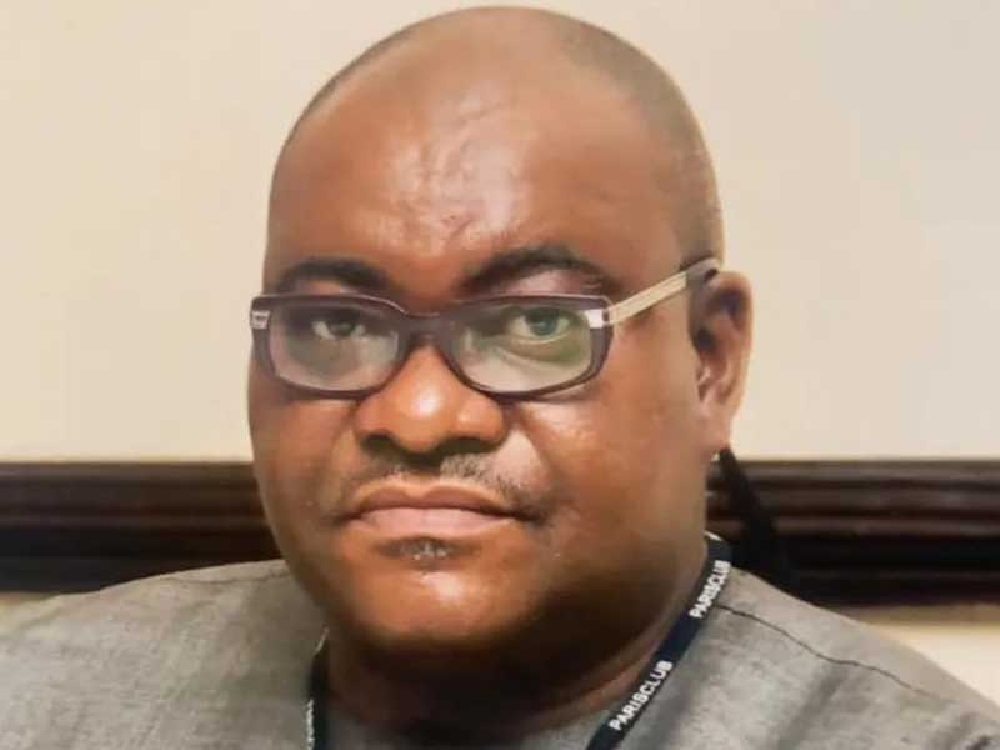
BY BOLAJI AFOLABI
Oftentimes, it’s always challenging to organize commemorative parties for those who have distinctions in this pastime. Dr. Tunde Olusunle, Adjunct Professor of Creative Writing at the University of Abuja; recently re-named Yakubu Gowon University is one of the few masters in the game. Over the last two decades of close relationship with him, he has played massive roles in organizing parties for people. Call him a highly-rated events planner, you may not be wrong. He is not the usual, typical party planner around who has taken up the vocation as business. Olusunle does this for people dear to him; friends, bosses, colleagues, associations, communities, and more pro bono. At any of these occasions, he throws everything towards making the event successful. He invests his time, intellect, organisational savvy, and personal resources; months, weeks, and days to make the event grandiose. Some of his close friends eulogized his dexterity, expertise, and capacities in single-handedly coordinating parties, events, and other celebrations.
The writer, cognisant that Olusunle will mark his birthday in the month of March, was somewhat worried. Why? This year’s birthday was different, as the multi-tasking professional will climb “six stairs” and join the unique club of 60. So, who will coordinate a befitting birthday shindig for the “master organizer?” Can such match the quality of similar others that Babaeto; one of his titles, and moniker loosely translated as “Chief Organizer” has arranged for people? How can the standard set by him be met, if not surpassed? Still pondering, a thought came to mind. Given the national economic crisis that has led to accentuating poverty, staggering hyperinflation, disabling unemployment, corrosive hunger, and more, Olusunle; who is ever conscious of situations around him, may spring surprises. He may opt for simpler and modest celebrations.
About two weeks to d-day, an e-invite forwarded to the writer confirmed one’s thought. The card was beautiful in colours; aesthetic in design; and unique in words. Having close similarities with Babaeto’s imprimatur, it read, “please join us for drinks, bites, and laughter as we commemorate the Diamond Birthday of our father, husband, brother, and good friend; Tunde Olusunle ……” Further checks confirmed that the event was packaged by Dr. Funmi Olusunle, with Aramide, Yomi, and Tobi; wife and children of Babaeto was to be a modest gathering of people. On this, the “plotters” scored a bull’s eye. Surely, Olusunle will be excited that his ever-loving, dependable, and reliable better-half of over three decades, and scions are gradually “edging him out” in the plotting, planning, and execution of numerous surprise parties for people.
The weather on Sunday, March 30 was clement and friendly, away from the scorching sun of the previous day. This was the first surprise while heading to the event. Driving through the Gaduwa-Lokongoma axis of the capital city, the writer had another round of pleasant surprises. Making a detour, vehicular movements to the Estate gate; which was over 400 meters away, gave an idea of what to expect. After “snaking and snailing” through the entrance, which was about 100 meters to the residence, it became clear, and evident that this may not be a small event, as originally planned. The writer, struggling for a comfortable parking space, recalled what Pastor Tumo Ojelabi; a retired Director, Federal Ministry of Information earlier said, “Oga is a friend to all. It is almost impossible to have a small party to mark his 60th birthday. Many people will attend the event, either invited or not.”
Scheduled to officially commence by 5 pm, the programme was up and running an hour before. Given the elaborate preparations for any eventualities, the early arrivers were treated to a collage of bites, drinks, and soul-lifting songs. In between, there were memorable photo sessions on the lush green carpet emblazoned with Olusunle’s very visible portrait properly affixed. As the day progressed, more people made their ways to the beautifully decorated outer foyer of the celebrant’s residence. Hearty exchange of pleasantries, excited high-fives, warm embraces, friendly hugs, and more swept the entire atmosphere. The lively gathering was an admixture of grandparents, fathers, and mothers. Not forgetting the youths, and children. Typical of Olusunle’s enviable virtues of accessibility, humility, humanity, and inclusivity, guests and attendees cuts across different strata of the society.
With Yomi standing-in for the day’s master of ceremonies, (MC), the programme commenced a few minutes past five in the evening. Pastor Omotoba of the Redeemed Christian Church of God, (RCCG) offered the opening prayers, which was brief and impactful. Yomi, as the fill-in compere did a good job, as she was able to galvanize the audience with few jokes, gesticulations, and puzzles. Perhaps sensing the bulk of the happy guests were in their 40s to 60s, she requested for the rendition of early-school rhymes in the 1970s to late 1980s. Masterstroke! Led by a few ladies, the entire place came alive as it brought back nostalgic memories. Thereafter, the MC took over. Aramide delivered a “love letter” that was full of emotions, inspiration, and gratitude. Tobi, the “baby” of the house, who is a strong supporter of English Premier League’s Manchester United was working behind the scenes to ensure the overall success of the birthday bash.
Virtually all those called to describe Olusunle in one word, used the opportunity to heap praises, prayers, and commendations on him. Dr. Tivlumun Nyitse, Associate Professor of Mass Communications at Bingham University, Abuja, confirmed that, “we have been friends for over 40 years. Over the years and decades, the relationship has grown from family to brothers. As I wish him a happy diamond birthday, I advise him to slow down.” Dr. Femi Ajisafe, an agriculture entrepreneur affirmed that, “we both joined, and started work as secondary school teachers somewhere way-off modernity in a rustic, and sleepy community in Kogi state over three decades ago. Happily, we have been together; and our respective families ever since.”
Saluting Olusunle’s resilience, Dr. John Olarewaju, former Director-General, Michael Imodu Institute of Labour and Development Studies, (MIILDS) revealed, “he is ever dogged, determined, and sacrificial. So committed and consistent with writing that he can do it anywhere.” For Dr. Clem Baiye, former Managing Director, Daily Times PLC, “Olusunle is a go-getter.” An obviously joyous and excited Madam Elizabeth Olusunle, Mother of the celebrant expressed appreciation to family members and friends, particularly Dr. Funmi Olusunle for her steadfast love, and consistent understanding of everyone. Mama, also prayed for her dear son. The session ended with an inspiring Yoruba rendition by Anuoluwapo Favour Fabiyi; a hugely gifted and brilliant teenager.
As the evening progressed, it was clear that the planned simple hoedown turned to a classy, high-energy reception laced with flair and flash. Evidently wrapped in panache, pomp, and pageantry. From meals to drinks, jokes, and more, the get-together had trappings of charm, elegance, and sophistication. The dazzles and allure literally arrested everyone all through. It was exciting, entertaining, and memorable. Filled with thrills, frills, grills, and much more. The night was filled with revealing stories and engaging reminiscences that will be inspiring takeaways for many people. The excellent dishing and mixing of “old school” songs got many; including the writer either humming the lyrics, shaking heads, moving bodies or hitting the dance floor.
Indeed, the quality and quantity of guests who came to honour Olusunle; at short notice was a worthy testament of the recognition and acceptability of the celebrant as a “peoples man.” The roll call of personalities was large. Chief Onyema Ugochukwu, pioneer Chairman, Niger Delta Development Commission, (NDDC), and his lovely wife, Dr. Joyce Ugochukwu; AIG Tony Olofu, (Rtd), and wife, DIG Rhoda Olofu; Hon. Leke Abejide, Member representing Yagba Federal Constituency, and his wife were there. Dr. Boboye Oyeyemi, former Corps Marshall, Federal Roads Safety Corps, (FRSC); Pastor Tunde Ipinmisho, former General Manager, Public Affairs, Federal Housing Authority, (FHA); Prof. Sunnie Ododo, former Chief Executive Officer, National Theatre. Dr. Emmanuel Ikpeme, Deputy Secretary-General, Nigerian Football Federation, (NFF); Chief Femi Melefa, consultant and entrepreneur; Pastor Yomi Babaniyi, and wife, and many others graced the occasion. Not forgetting Hon. TeeJay Yusuf, and Deputy Corps Marshall Clement Oladele, who were out of the country and Abuja respectively, but extended their congratulatory messages to Olusunle.
As the elegant soiree spread late night guests had more to savour. Properly garnished, sumptuous delicacies, refrigerated drinks, and eye-popping small chops flowed endlessly. Undoubtedly, the knees-up; according to the British were exhilarating and enthralling. For many, the event, turned out to be a worthy, timely rendezvous of sorts. There was a reunion of old friends; re-kindling of friendships; and building of new networks. Many agreed that it will be an unforgettable experience.
* BOLAJI AFOLABI, a Development Communications specialist was with the Office of Public Affairs, The Presidency, Abuja.
Opinion
CELEBRATING A PRODIGIOUS WORDSMITH: TUNDE OLUSUNLE @ SIXTY
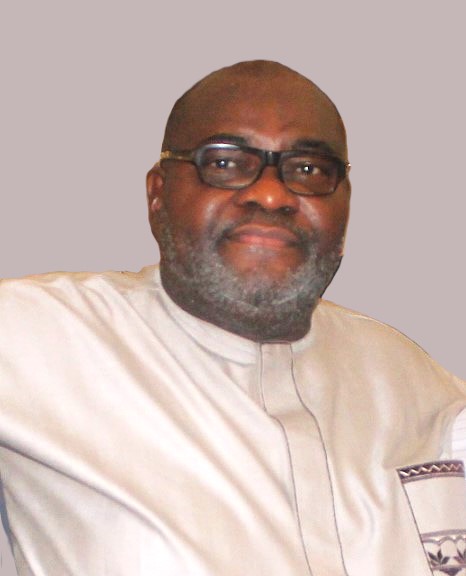
BY BOLAJI AFOLABI
Poring over countless title-ideas for this article, the above emerged from the blues. Further checks about the subject confirmed the title as fit and proper. Describing Tunde Olusunle as a “prodigious wordsmith” is no exaggeration. In every of his work, he comes across as one who has vocabulary virtuosity, and endowed with narrative mastery. He displays unimaginable linguistic dexterity which is intertwined with rhetorical flair, and imbued with creative vision. He carves the right words, and descriptive styles to paint beautiful scenery of complex and cumbersome situations. He crafts, engages, and suspends readers till the last words are happily soaked in. So, the title is both deliberate and intentional.
Dr. Tunde Olusunle, an Adjunct Professor of Creative Writing at the University of Abuja; which was recently re-named Yakubu Gowon University, is a man of many parts. He is a celebrated journalist; author; poet; communicator; and public speaker. Thus, he fits into all the fields where intellect, elucidation, and erudition coalesce. As a Columnist and Editor, he rose to the top of Journalism. In Literature, aside from having degrees, he has many published (and yet to be published) poems. He has written, co-written, edited, and co-edited over a dozen books; earning the Fellowship of the Association of Nigerian Authors, (FANA). In the last few years in academia, he is making exceptional accomplishments as a scholar, teacher, and researcher nurturing and mentoring a new generation of creative writers.
Sometime in the ’90s; during the Late General Sani Abacha regime, the writer went to the Saka Tinubu, Victoria Island, Lagos office of an elder brother; Ade-Ralph Olamife. After late lunch at the classy canteen within the precincts of the Nigeria Telecommunications Limited, (NITEL) offices, the host extended an invitation. He said, “I want you to join me later today to meet a friend coming from Ikeja.” About 7 pm, we (Olamife, two other friends, and the writer) drove into Bishop Oluwole Street in Victoria Island, Lagos. The building was the Kogi state Liaison Office at that time. Surprisingly, the august friend, who came with another person was already seated. After the exchange of pleasantries, the subject of this article was introduced by Olamife. Olusunle, who came with Alhaji Hakeem Bello; later Media Adviser to Babatunde Raji Fashola, (SAN), interacted freely with everyone. During the over two hours sit-out, Olusunle came across as a witty, lively, intelligent, and brilliant personality.
After this first meeting, the writer; through Olamife had subsequent interactions with Olusunle in Ikeja, Maryland, Ikoyi, and Victoria Island areas of Lagos. On every occasion, he exudes confidence and accessibility just as his humble and humane attributes come alive. After over a year of gap, largely due to the analogue communication state, and his relocation out of Lagos, Olamife broke the cheering news of Olusunle’s appointment as the Chief Press Secretary to the Kogi state Military Administrator; Col. Paul Omeruo. A few months later, the writer accompanied (as usual) Olamife; to visit Omeruo in Lokoja. By the way, both Olusunle and Olamife are mutual friends to the Administrator, fondly referred to as PUNO; initials of his names. During the two-week visit, Olusunle was the perfect host; he made every evening eventful and memorable. From discussions, many civil servants spoke glowingly about him. In and around the Lugard House; Administrator’s residence and office, as well as Ministries, Departments, and Agencies, (MDAs), his interpersonal relationships were eulogized. Succinctly, he could be described as a people’s man.
With the birth of democracy in May 1999, and the inauguration of Chief Olusegun Obasanjo as the President and Commander in Chief of Nigeria, the writer partially relocated to Abuja, hoping to explore opportunities in the new government. Watching the Nigerian Television Authority’s flagship news, the advert inviting people to the official launch of the new administration’s “Campaign for National Rebirth” sounded interesting. The writer made his way to the purposely-built Eagle Square venue of the event. As the programme progressed, the presence and importance of Olusunle was very evident. Events over, the writer swiftly moved from the stands down the platform to offer salutations to him. Pushed, shoved aside by over-zealous security operatives, it was a herculean task. At the point of giving up, an incident happened which diverted the attention of almost everyone. Leveraging on this, the writer made his way to the dais. Standing before Olusunle, he called the writer’s name, hugged, and exchanged pleasantries. Quickly, he said, “I’ll be out of Abuja for one week, meet me at Sheraton Hotels next week please.”
The writer’s visit to Sheraton Hotels marked the beginning of a relationship that has grown in leaps and bounds. Either at the Hotel’s Papillon Restaurant or the Poolside Bar, and Nicon Noga (now Transcorp) Hilton Hotel, the compassionate, empathetic, and accommodating attributes of Olusunle always come to the fore. They were unmistakable and unequivocal. During one of the numerous visits, he requested for the writer’s curriculum vitae; without saying what he wanted to do with it? It was discovered, early that he loves working behind the scenes. Beneficiaries of his advocacy, and benevolence only get to know when “food don done for eating.” One recalls on a visit to his 7th floor, Sheraton Hotels “temporary official residence” he beckoned on the writer to accompany him to somewhere. In a few minutes, we were in one of the suites at the Hilton Hotel, only to see Chief Onyema Ugochukwu, emeritus journalist, and public administrator walked in. With shock, suspense, and excitement written on one’s face, Olusunle introduced the writer saying, “Oga, this is one of our younger but silent supporters.”
A few months later, the import of that visit came to light. Through the persistent advocacy, and resilient prodding of Ugochukwu and Olusunle, President Obasanjo gave approval for major recruitments to strengthen the rebirth campaign, and public affairs management of the new government. So, the writer and other people benefitted from a forward-thinking proposal that was primarily targeted at media professionals who were part of the Obasanjo presidential campaign organization. Pastor Tumo Ojelabi, a retired Federal Director who was one of the beneficiaries declared that, “Oga, is a fastidious personality, a determined helper who can be positively stubborn, and dogged when pursuing a course that he has strong conviction about.” Continuing, Ojelabi, who was the official Photographer to Obasanjo during the presidential campaign said, “but for his resilience, courage, and never-quiver spirit; and Oga Ugochukwu, many of us who toiled during the campaigns would have been left dry.” For Mr. Taiwo Akinyemi, who was Obasanjo’s campaign Official Videographer, “Olusunle is a fighter; a dynamic fighter for other people. When he realized that politicians who did not contribute much to Baba’s electoral success were getting their loyalists into the new government, he fought relentlessly for us all. God used him to get me employed in the federal civil service, I remain eternally grateful.”
Olusunle is a pan-Nigerian, totally detribalized, and not given to ethnicity, religious segregation and similar stereotype. Described by close friends as diligent, dedicated, and devoted to friendship, Olusunle remains a restless and tireless quester for knowledge and new challenges. Given his multi-dimensional, and multi-tasking skills and proficiencies, he can excel in whatever profession, assignment, and position. Energized by his voracious search for new ideas, he is almost, always thinking out of the box. Very ingenious, creative, and imaginative, one recalls few initiatives that came from his fertile mind during the Obasanjo presidency. Persistent encouraging words about Nigeria’s sports which led to the inclusion of the “sports brief” to his schedules. Advocacy for the hosting of the Commonwealth Heads of Government Meeting, (CHOGM) at any of the nation’s resorts; which informed him leading a team of journalists, tourism experts, and bureaucrats to the Yankari Games Reserves in Bauchi. What about the National Media Tour, though initiated by him but hijacked by a few top government officials who at the end muddled the entire programme?
Corroborating, Mr. Vincent Oyefeso, a retired Federal Director, and another beneficiary of the Obasanjo appointments approval, said, “he is an illustrious Nigerian and a patriot per excellence, who bestrides many walks of life as an intellectual collossus, a humanist of no mean hue, and an advocate of the finest social ethos. At the realms of public communications, the academia, and public service, he exudes the best practices worthy of emulation by right-thinking compatriots.” For Mr. Ukadike Uwabor, a media communications consultant, “since I’ve known him, he has remained consistent with the core values of excellence, versatility, and intellect. He relates perfectly with different people no matter the age, religion, tribe, or social status. Little wonder his friends cut across different strata of the society. That the people of Umukabia autonomous community in Abia state conferred on him a chieftaincy title; which is outside his geographical, ethnic, and linguistic zone speaks volumes about his personality.” Olusunle by the way, has few other titles bestowed on him in different parts of the country.
Agreed, no human being is perfect but the writer has personal experiences about Olusunle that remains nostalgic. Indeed, the over two decades relationships have grown from one stage to the other. From boss to teacher, mentor, and motivator. He has played (and continues to play) different roles in one’s professional development, and career progression. Perhaps, he may not realize this; while working with him, Olusunle doesn’t attend meetings alone. The writer, Late Alhaji Wasiu Anjous, and (on few occasions) Akinyemi accompanied him to any meeting, particularly with MDAs. Another striking feature was that he introduced you as a “colleague.” With that, one’s stock, respect, and recognition increases. One of the fall-out of such remarkable style happened at the 2004 Olympics Games in Greece, when Late Mr. Solomon Matankari, Nigeria’s Chef de Mission, and Sports Ministry’s Permanent Secretary insisted on the participation of Anjous and the writer in high-level meetings.
Not persuaded by the hierarchical structure of the civil service, Olusunle places premium on availability, delivery, and consistency. Just a few months after being deployed to his office, the writer had a baptism of fire. Barely 48 hours after one of the regular presidential chats, Olusunle passed the recorded tape, and declared, “do transcribe and deliver in three days.” Sensing shock, and surprise, he encouraged, “you can do it, go at your pace.” On another occasion, a few days after commending the writer on a piece, “From Saw Dust To The Skies,” he said, “write a speech for Dr. Mrs. Kema Chikwe, the Aviation Minister, for a programme this Saturday to be held in Garki, Abuja.” Though tough but exciting, it marked my entry into the exclusive class of speech writers; till this moment. Sometime in 2023; after long hiatus from opinion writing, due to a new assignment at the National Assembly, the writer did a piece. Impressed, Olusunle called immediately, “BJ, I’ve just read your brilliant article. I encourage you to make this more regular, please. I’m available to offer any support where and when necessary.” Truly, he has kept faith to his promise in the over thirty articles written between December 2023 and now.
This is the man we are celebrating today, and always. Olusunle is an extremely organized personality, whose writings and interventions are laced with irrefutable data, educative instances, and inspiring suggestions. When occasions demands, you can’t help but applaud his depth of knowledge, information reservoir, deep vistas, and un-ending capacity. Oyefeso prays that, “the Lord grants him peace as he steps into the sixth floor. The Father of Lights will continually uphold and uplift him from Glory to Glory in Jesus Name.” Mr. Jacob Zwings, aide to Director-General, National Orientation Agency added that, “Oga Tunde, in his own way has impacted positively on the lives of people. On the occasion of his Diamond jubilee, I pray that God will perfect everything that concerns him and his family.” Akinyemi declared that, “just as he has been a blessing to other people’s children, God will bless him, his wife, and children.” Uwabor believes that, “Enyi Oha has become a reference point to many people. The good Lord will grant him more years in good health as he age gracefully with abundance of all-round blessings.” Ojelabi affirmed that, “Olusunle is who he is today; an accomplished man who stands tall among his peers because of his commitment towards extending helping hands to those who needs it.”
* BOLAJI AFOLABI, a Development Communications specialist was with the Office of Public Affairs, The Presidency, Abuja.
-
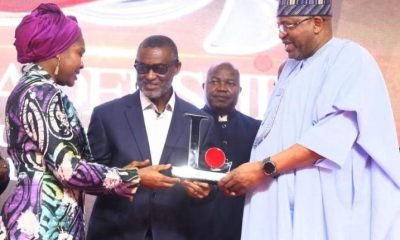
 News20 hours ago
News20 hours agoAgain, FCT minister emerges winner of quinquennial Leadership award
-

 News14 hours ago
News14 hours agoAkpabio wants Senator Natasha jailed over inflammatory comments
-

 News3 hours ago
News3 hours agoAmbassadorial list ready for NASS review after DSS clearance – FG
-

 News11 hours ago
News11 hours agoMichelle Obama Speaks In Alleged Failed Marriage with Her Husband Barack Obama
-

 News22 hours ago
News22 hours agoSEE Current Black Market Dollar (USD) To Naira (NGN) Exchange Rate
-
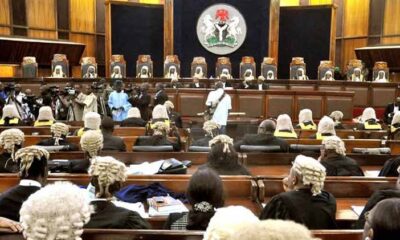
 News14 hours ago
News14 hours agoSenior lawyer caution against misinterpretation of Supreme Court Judgement
-

 Education18 hours ago
Education18 hours agoJAMB deploys decoy website to tackle examination malpractices
-
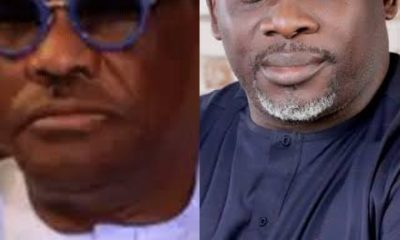
 News18 hours ago
News18 hours agoLeadership Quinquennial Award: TeeJay Yusuf hails FCT Minister, Wike, says “he’s truly a trail blazer”





